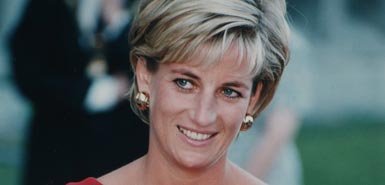Diana jury
Diana jury told: only your opinion matters
 The 11 members of the public sworn in as the jury for the Diana, Princess of Wales inquest were told today that their judgment of her death is now “the only view that matters”.
The 11 members of the public sworn in as the jury for the Diana, Princess of Wales inquest were told today that their judgment of her death is now “the only view that matters”.
Six women and five men were selected this morning as members of the jury for the inquest into the death of Diana and her boyfriend Dodi Al Fayed, who were killed in a car crash in Paris in August 1997.
It was literally a lottery: each person was chosen at random from a list of 24 – one potential juror was excused from the inquest, which is expected to take up to six months, because his bad leg meant he could sit for no longer than 45 minutes.
Sitting in courtroom 73 of London's High Court, watched by representatives of the Spencer and Al Fayed families, and an aide to Princes William and Harry, the new jury took an oath to "diligently inquire" into the couple's deaths.
Then, at 11am, the Diana inquest officially began with the coroner, Lord Justice Scott Baker's opening address.
Reading from the 150-page document, which he was not expected to complete until tomorrow, the coroner said one of the aims of the inquest was to "allay speculation and rumour".
He emphasised the importance of the opinions of the 11 jurors, whose lives will now forever be linked with the extraordinary case delving into the death of the "People's Princess".
"Most, if not all of you, will remember where you were when you heard about the … death of the Princess of Wales," he said.
"None of you would for a moment have thought that over 10 years later you might be in a jury investigating the events related to that tragic August night - but you are and the task you have is an important one and it is yours and yours alone.
"No one can tell you what to decide, although I shall do what I can to assist, in particular by summing up the evidence and directing you on the law at the end of the hearing."
In the court to witness the beginning of the historic hearing was Diana's sister Lady Sarah McCorquodale, who was accompanied by Major Jamie Lowther-Pinkerton, part-time private secretary to Diana's sons, Princes William and Harry.
They sat on opposite sides of the court from Dodi's father Mohamed al-Fayed.
Earlier the Harrods owner said he was "hoping for justice" from the inquest.
"I'm a father who lost his son," Mr Al Fayed said. "I have been fighting for 10 years, at last I want to have justice."
The tycoon claims that the Princess was pregnant with Dodi’s child and has been calling for members of the Royal Family – including the Queen, Prince Philip and the Prince of Wales – to give evidence at the inquest to probe his claims of an establishment murder plot.
They are unlikely to be called – by law the Queen, as Sovereign, is not compelled to give evidence – however over 60 witnesses are expected to give evidence.
Outside the court Mr al-Fayed said: “At last we are going to have an inquest for ordinary people. I hope that it will bring the decision, which I believe, that my son and Diana were murdered.”
A coronial inquest is legally required when a British citizen dies an unnatural death abroad and the body is repatriated to determine who died, when and where, and how.
Princes William and Harry, who marked the 10th anniversary of their mother’s death this year, have called for a swift resolution to the case, but it looks set to last up to six months.
The coroner said the reason for the inquest a decade after the car crash was because Diana’s death is “a subject upon which most members of the British public and many overseas appear to have a view, often based on no evidence at all or based on only part of the picture”.
“Much has been written or broadcast, often showing a disregard for the facts,” he said.
“But your decision, when you have heard all the evidence, is the view that matters.”
He told the jurors that their role was to decide four questions: who died, when they died, where they died and how they died.
Of the fourth question, effectively the verdict, the coroner said: “Because of the unique nature of this case we shall explore that question a great deal more widely than would ordinarily be the case.
“We shall investigate matters some of which may very well turn out to be irrelevant to the cause of the deaths because one of the purposes of an inquest is to allay speculation and rumour.”
(Published by Times Online, October 2, 2007)
______________________